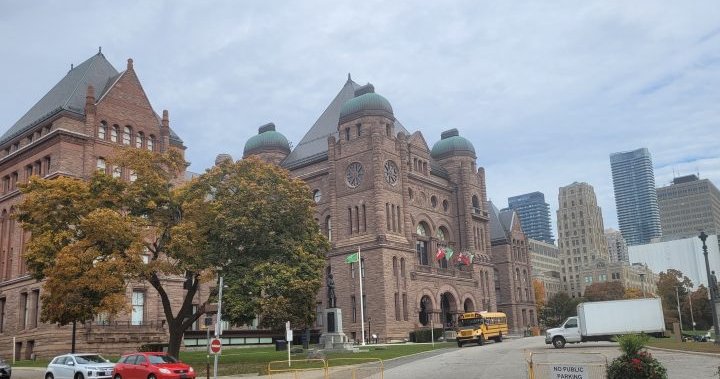Ontario NDP Leader Marit Stiles is vowing to escalate efforts to overturn a ban on wearing the keffiyeh inside Queen’s Park when legislators reconvene in May. Speaker Ted Arnott banned the Arab headdress, considering it a “political statement” that violated rules against using props or clothing to send a message inside the house. Premier Doug Ford, along with Stiles, Greens, and Liberals, oppose the ban, while some Progressive Conservative caucus members support it. Ford allowed his MPPs to vote freely on the issue after failing to get them to follow his lead, citing sensitivity within his caucus.
Stiles issued an ultimatum to Ford in a video, demanding the ban be reversed by May 6 or face defiance from the opposition benches. She called on Ford to do the right thing, reverse the ban, and unite the community in fighting anti-Palestinian racism, hate, and division. The NDP did not clarify how they would defy the ban, and Ford’s office reiterated his stance that the ban is divisive. The keffiyeh issue has caused tension at Queen’s Park, with Independent MPP Sarah Jama being punished for defying the ban by wearing the scarf and a demonstration outside Ford’s office taking place in protest.
The keffiyeh has been a symbol of solidarity with Palestinians in Arab cultures, sparking debate within the Ontario government. Stiles and other party leaders have expressed opposition to the ban, while Arnott deemed it a violation of parliamentary rules. Ford has faced pressure to overturn the ban, with the NDP giving him a deadline to act or face opposition defiance. Despite opposition to the ban, some members of the Progressive Conservative caucus support Arnott’s decision, leading to internal conflict within the government.
Stiles’ ultimatum to Ford highlights the ongoing controversy surrounding the keffiyeh ban at Queen’s Park. The NDP leader is determined to challenge the ban and stand in solidarity with those who wear the scarf as a symbol of support for Palestinians. Ford’s hesitation to act on the issue has prompted opposition defiance and protests, indicating the importance of addressing the ban as a matter of principle. The keffiyeh has become a focal point of debate within the Ontario legislature, reflecting broader discussions around cultural symbols, solidarity, and political expression.
The conflict over the keffiyeh ban underscores the intersection of politics, culture, and symbolism in the legislative setting. Arnott’s decision to ban the headdress as a “political statement” raises questions about freedom of expression and the use of clothing and props as forms of messaging in the parliamentary space. Stiles’ ultimatum to Ford signals a commitment to challenging the ban and advocating for the rights of individuals to express their solidarity with marginalized communities. The ongoing debate surrounding the keffiyeh ban highlights the complexities of cultural representation and political activism within the government.
Overall, the dispute over the keffiyeh ban in Queen’s Park reflects broader tensions surrounding cultural symbols, political expression, and solidarity with marginalized communities. Stiles’ efforts to overturn the ban and Ford’s response to the ultimatum illustrate the complex dynamics at play within the Ontario legislature. The ongoing debate over the keffiyeh ban underscores the importance of addressing issues of cultural sensitivity, political messaging, and freedom of expression within the parliamentary setting. As legislators prepare to reconvene in May, the keffiyeh issue is likely to continue shaping discussions and actions within the Ontario government.













